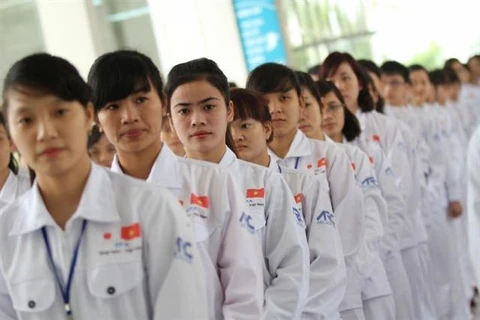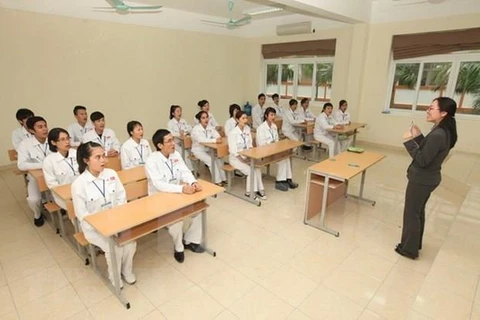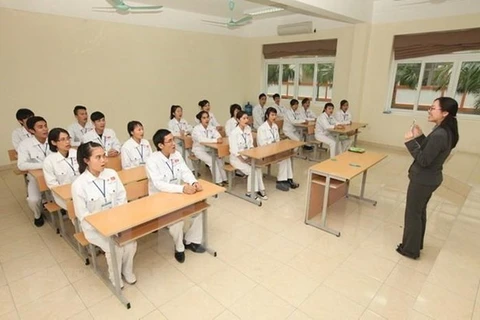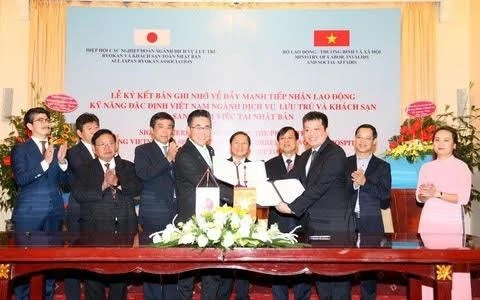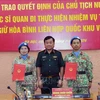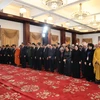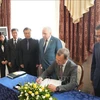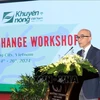Hanoi (VNA) – Minister of Labour, Invalids and Social Affairs Dao Ngoc Dung said all countries that receive Vietnamese workers must have labour agreements with Vietnam and comply with those documents.
At a press conference held by the Government Office on June 4, Dung said the 39 Vietnamese deaths found in a container truck in Essex county, northeast of London, the United Kingdom, was a painful incident.
He also took this occasion to send condolences to the victims.
Giving the media an insight into labour export, he said under regulations, all countries that receive Vietnamese workers must have labour agreements with Vietnam and comply with those documents.
Accordingly, people can legally go to work overseas through five channels, including the businesses licensed by the Ministry of Labour, Invalids and Social Affairs (MoLISA); cooperation between domestic and foreign enterprises; and directly signing labour contracts with businesses and organisations in other countries after registering with the departments of labour, invalids and social affairs of Vietnamese localities and those countries’ managerial agencies.
They can also work overseas under training cooperation between licensed parties, or under labour cooperation between localities of Vietnam and other countries in the short term, according to the minister.
At present, there are nearly 400 enterprises licensed to send workers abroad. Over the past years, more than 100,000 people have gone to work in other countries annually.
The highest figure was recorded in 2018, when up to 143,000 workers were sent abroad, mostly Japan, the Republic of Korea, Taiwan (China) and Malaysia, he noted.
To the European region alone, Vietnam has signed cooperation deals with Romania and Germany. Notably, over 1,060 caregivers have been sent to Germany under a recently inked agreement.
He said he had directly visited the labourers’ workplaces and known their lives there were very good and income was 2,600 EUR at that time. After discussing, their employers agreed to raise the income to 3,000 EUR each month.
He also affirmed that the sending of labourers abroad is transparent, from expenses, salary, visa, passport to labourers’ benefits.
Pointing out the reverse of labour export, Dung noted some units that do not have legal entity or function but still borrow licenses or collude with others to send labourers to other countries. Additionally, there are some that are not licensed but still do this illegally, and authorities have dealt with a relatively big number of such cases.
The officials said all illegal cases will be strictly handled, and some businesses that committed violations will be even banned forever.
Given the recent incident in the UK, he recommended people who plan to work overseas should go through legal channels, including licensed agencies or foreign enterprises that have had registered with Vietnamese authorities, and absolutely steer clear of illegal channels.
Statistics of the MoLISA show that in the first nine months of 2019, Vietnam sent 104,615 labourers abroad, equivalent to 87.2 percent of the year’s target of 120,000.
During the period, Japan was the biggest recipient with 53,610 Vietnamese labourers. It was followed by Taiwan 41,174, the Republic of Korea 5,898, Romania 1,103, Saudi Arabia 817, Macau (China) 324, and Malaysia 304.
Nguyen Gia Liem, Deputy Director of the ministry’s Department of Overseas Labour, said Taiwan and Japan are the traditional and also biggest markets of Vietnamese labourers as they have been the destinations of more than 90 percent of Vietnam’s total guest workers in the recent past.
Japan is the most potential market at present, he noted, adding that it not only offers good salary but also provides numerous job opportunities for skilled workers.
Meanwhile, many Eastern European countries have also shown interest in Vietnamese labourers. Along with traditional markets, hundreds of thousands of job opportunities are available for Vietnamese workers in Europe thanks to deals on labour cooperation signed in late 2018, Liem said.
The Department of Overseas Labour attributed the results to rising demand in major markets and Vietnamese workers meeting quality requirements in many new areas such as nursing, agriculture, aquaculture and technology. Efforts have also been taken by firms to expand markets and improve the quality of the labour force. Furthermore, labourers themselves have upgraded their skills./.


